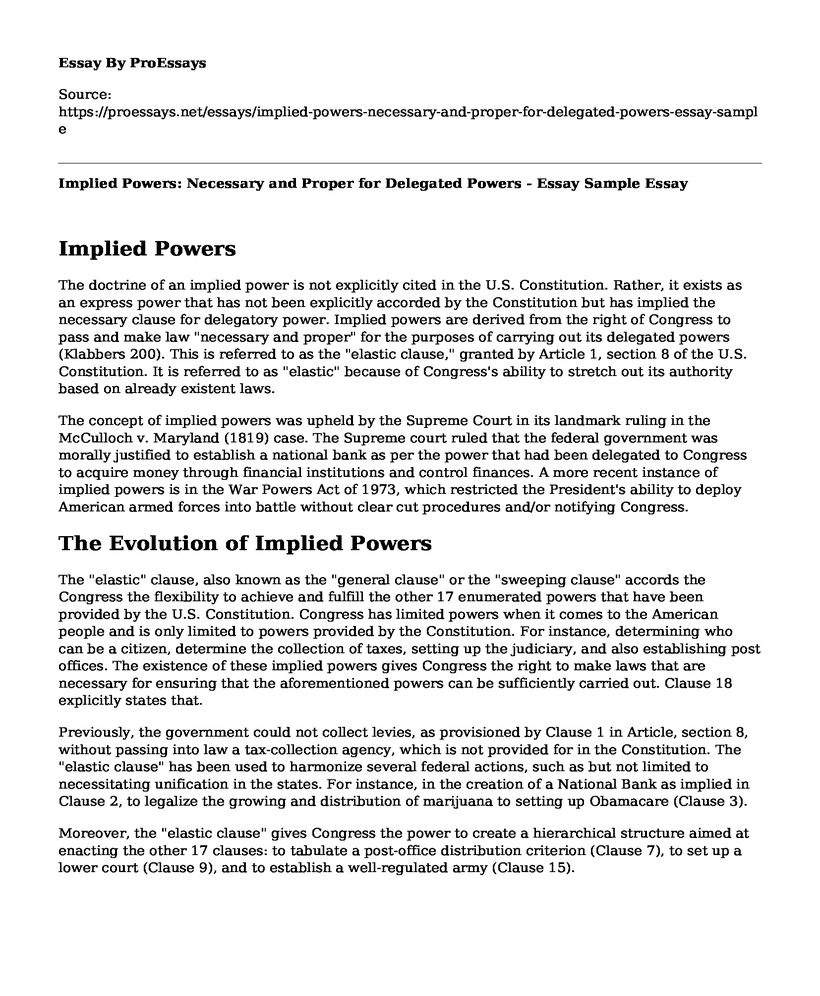Implied Powers
The doctrine of an implied power is not explicitly cited in the U.S. Constitution. Rather, it exists as an express power that has not been explicitly accorded by the Constitution but has implied the necessary clause for delegatory power. Implied powers are derived from the right of Congress to pass and make law "necessary and proper" for the purposes of carrying out its delegated powers (Klabbers 200). This is referred to as the "elastic clause," granted by Article 1, section 8 of the U.S. Constitution. It is referred to as "elastic" because of Congress's ability to stretch out its authority based on already existent laws.
The concept of implied powers was upheld by the Supreme Court in its landmark ruling in the McCulloch v. Maryland (1819) case. The Supreme court ruled that the federal government was morally justified to establish a national bank as per the power that had been delegated to Congress to acquire money through financial institutions and control finances. A more recent instance of implied powers is in the War Powers Act of 1973, which restricted the President's ability to deploy American armed forces into battle without clear cut procedures and/or notifying Congress.
The Evolution of Implied Powers
The "elastic" clause, also known as the "general clause" or the "sweeping clause" accords the Congress the flexibility to achieve and fulfill the other 17 enumerated powers that have been provided by the U.S. Constitution. Congress has limited powers when it comes to the American people and is only limited to powers provided by the Constitution. For instance, determining who can be a citizen, determine the collection of taxes, setting up the judiciary, and also establishing post offices. The existence of these implied powers gives Congress the right to make laws that are necessary for ensuring that the aforementioned powers can be sufficiently carried out. Clause 18 explicitly states that.
Previously, the government could not collect levies, as provisioned by Clause 1 in Article, section 8, without passing into law a tax-collection agency, which is not provided for in the Constitution. The "elastic clause" has been used to harmonize several federal actions, such as but not limited to necessitating unification in the states. For instance, in the creation of a National Bank as implied in Clause 2, to legalize the growing and distribution of marijuana to setting up Obamacare (Clause 3).
Moreover, the "elastic clause" gives Congress the power to create a hierarchical structure aimed at enacting the other 17 clauses: to tabulate a post-office distribution criterion (Clause 7), to set up a lower court (Clause 9), and to establish a well-regulated army (Clause 15).
Implied Powers in Strengthening the Powers of the US Government
The exclusion of implied powers restricted Congress's powers to only what was provided by the Constitution. The doctrine of implied powers, therefore, accords Congress the power to create laws to effectively and efficiently carry out its duties. In essence, by including the Necessary and Proper Clause (Barnett 183), the Framers of the Constitution set a criterion for laws such that even if they are not within the grants of the Constitution, Congress would still be able to serve the people effectively.
The Framers of the Constitution fashioned the Necessary and Proper Clause to serve two main purposes. The first was aimed at facilitating the government's organization by empowering Congress to organize the Judiciary (Article I, Section 8, Clause 9). Previously, Congress could not direct or dictate the government's organization, so Edmund Randolph, a Detail Committee member, proposed that Congress be empowered to organize the government. This was seconded by James Wilson, who proposed the "Necessary and Proper Clause" as a proxy to empowering Congress. The second purpose was to help Congress effectuate its other specified powers so long as it operated within the scope of enumerated powers.
Conclusion
Implied powers, through the "elastic clause," have seen to grant Congress the power to carry out its delegated duties without necessarily acting out of the scope of the provisions of the Constitution. As in the McCulloch and Maryland (1819) case, these implied powers are necessary for the Constitution to carry out its delegated duties.
Works Cited
Andersson, Staffan, and Paul M. Heywood. "The politics of perception: use and abuse of Transparency International's approach to measuring corruption." Political Studies 57.4 (2009): 746-767.
Barnett, Randy E. "The Original Meaning of the Necessary and Proper Clause." U. Pa. J. Const. L. 6 (2003): 183.
Definition of power in English by Oxford Dictionaries. Retrieved from https://www.lexico.com/en/definition/power
Klabbers, Jan. "Constitutionalism lite." Globalization and International Organizations. Routledge, 2017. 197-224.
McCulloch v Maryland. 17 U.S. 316 (1819) Retrieved from http://www.law.cornell.edu/supct/html/historics/USSC_CR_0017_0316_ZS.html
Kozlowski, Darrell J., and Jennifer L. Weber. Federalism. Infobase Publishing, 2010.
Cite this page
Implied Powers: Necessary and Proper for Delegated Powers - Essay Sample. (2023, Feb 20). Retrieved from https://proessays.net/essays/implied-powers-necessary-and-proper-for-delegated-powers-essay-sample
If you are the original author of this essay and no longer wish to have it published on the ProEssays website, please click below to request its removal:
- Trump's Acceptance Speech Analysis
- A Claim of Policy: Electric Cars Essay
- American Policies and Actions 1945-1975 Essay
- Democratization in Egypt and Tunisia - Essay Sample
- Essay Example on Annuities Savings: Policymaking, Social Preferences & More
- Essay Example on Heroin Use Increases: Challenges and Trafficking Abuse
- Essay Example on Ohio State: A Midwestern State in the US







